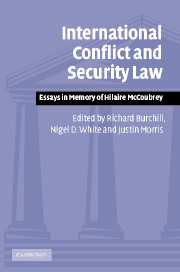Book contents
- Frontmatter
- Contents
- Biography of Hilaire McCoubrey
- Notes on contributors
- Foreword: There are men too gentle to live among wolves
- List of abbreviations
- 1 Hilaire McCoubrey and international conflict and security law
- 2 The development of operational law within Army Legal Services
- 3 Reflections on the relationship between the duty to educate in humanitarian law and the absence of a defence of mistake of law in the Rome Statute of the International Criminal Court
- 4 Superior orders and the International Criminal Court
- 5 Command responsibility: victors' justice or just desserts?
- 6 The proposed new neutral protective emblem: a long-term solution to a long-standing problem
- 7 Towards the unification of international humanitarian law?
- 8 Of vanishing points and paradoxes: terrorism and international humanitarian law
- 9 What is a legitimate military target?
- 10 The application of the European Convention on Human Rights during an international armed conflict
- 11 Regional organizations and the promotion and protection of democracy as a contribution to international peace and security
- 12 Self-defence, Security Council authority and Iraq
- 13 International law and the suppression of maritime violence
- 14 Law, power and force in an unbalanced world
- Bibliography of Hilaire McCoubrey's work
- Index
4 - Superior orders and the International Criminal Court
Published online by Cambridge University Press: 17 July 2009
- Frontmatter
- Contents
- Biography of Hilaire McCoubrey
- Notes on contributors
- Foreword: There are men too gentle to live among wolves
- List of abbreviations
- 1 Hilaire McCoubrey and international conflict and security law
- 2 The development of operational law within Army Legal Services
- 3 Reflections on the relationship between the duty to educate in humanitarian law and the absence of a defence of mistake of law in the Rome Statute of the International Criminal Court
- 4 Superior orders and the International Criminal Court
- 5 Command responsibility: victors' justice or just desserts?
- 6 The proposed new neutral protective emblem: a long-term solution to a long-standing problem
- 7 Towards the unification of international humanitarian law?
- 8 Of vanishing points and paradoxes: terrorism and international humanitarian law
- 9 What is a legitimate military target?
- 10 The application of the European Convention on Human Rights during an international armed conflict
- 11 Regional organizations and the promotion and protection of democracy as a contribution to international peace and security
- 12 Self-defence, Security Council authority and Iraq
- 13 International law and the suppression of maritime violence
- 14 Law, power and force in an unbalanced world
- Bibliography of Hilaire McCoubrey's work
- Index
Summary
Introduction
I would like to start by violating at least one rule of traditional legal writing. That rule is that, in such writing, personal matters should not be discussed. I will begin with my personal recollection of Hilaire McCoubrey. We were both at Cambridge University (his alma mater) in the summer of 1997, attending a British Red Cross course on international humanitarian law. I was a PhD student in Nottingham, he was teaching the course in Cambridge. It was a beautiful evening, and we had finished for the day. Hilaire had been teaching the protection of the wounded, sick and shipwrecked. Owing to the felicitous weather, he and a few others (myself included) repaired to a local pub overlooking the river Cam. There we watched the sun set, refreshed ourselves, and talked at length over one of Hilaire's favourite subjects, the Nuremberg and Tokyo International Military Tribunals (IMTs), a subject about which he had prodigious knowledge and understanding. The fond memory I have of that evening, although now tinged with sadness, is how I like to remember Hilaire.
One of the issues raised at the Nuremberg IMT, superior orders, also provides the subject matter for my contribution to this volume. The defence of obedience to orders has been the subject of considerable attention by international lawyers. Hilaire put in his ‘two pennyworths’ late in his life. However, while some constitutional lawyers have discussed superior orders, domestic criminal lawyers have not on the whole spent much time on the defence (though it should be mentioned that Dinstein's work is sophisticated from a criminal law point of view).
- Type
- Chapter
- Information
- International Conflict and Security LawEssays in Memory of Hilaire McCoubrey, pp. 49 - 67Publisher: Cambridge University PressPrint publication year: 2005
- 5
- Cited by



